PostTime:9/3/2024
Recently, the research group of Assoc. Prof. Wang Yan from Guangdong Technion - Israel Institute of Technology (GTIIT) published high-impact review articles in top journals including Advanced Materials.
The first authors of the articles are: GTIIT undergraduate student Mo Fan, GTIIT postgraduate student Zhang Yujie and Dr. Gong Yanting, a postdoctoral researcher at the University of Macau. Assoc. Prof. Wang Yan is the corresponding author of the papers.

Wang Yan with Her Team: Zhang Yujie (3rd from Left in front row); Mo Fan (1rd from Left in second row)
GTIIT Undergraduate Mo Fan Published High-Impact Review Article in Advanced Healthcare Materials
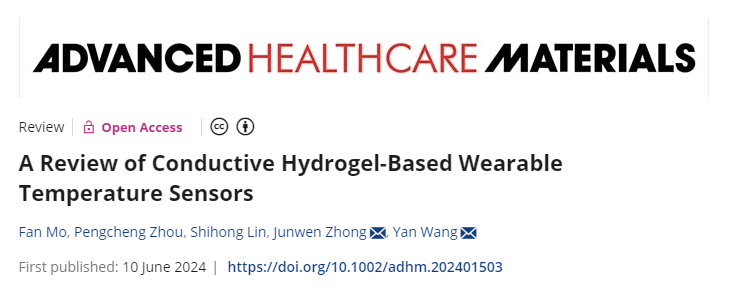
On June 10, a GTIIT undergraduate student Mo Fan (Pandeng program fund receiver) from Wang Yan's team published a review article titled "A Review of Conductive Hydrogel-Based Wearable Temperature Sensors" in the academic journal Advanced Healthcare Materials (Impact Factor 10) as the first author. The corresponding author are Zhong Junwen from the University of Macau and Wang Yan from GTIIT.
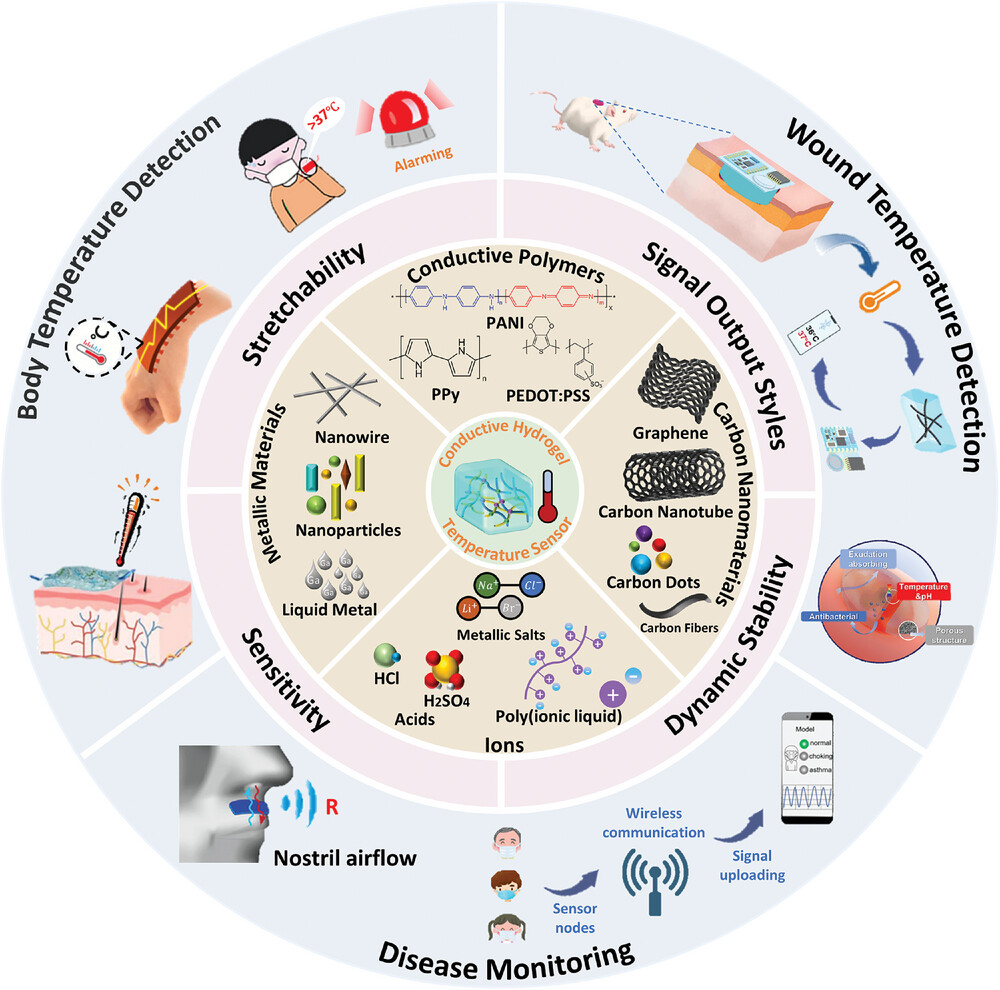
In this paper, the research team starts with design strategies for conductive hydrogels, systematically summarizing recent developments of different types of conductive hydrogel-based temperature sensors, essential sensing properties, applications under various temperature sensing scenarios, and the challenges faced in system integration, self-powering, long-term stability, and commercialization. The paper first introduces typical conductive hydrogel materials, such as conductive polymer-based, carbon nanomaterial-based, metal-based, ion-based, and composite materials. Further, it discusses the sensing performance required for wearable temperature sensors based on conductive hydrogels, such as sensitivity, dynamic stability, stretchability, and signal transmission methods. Then, the paper highlights typical applications of conductive hydrogel-based wearable temperature sensors, including body temperature monitoring, wound temperature detection, and disease monitoring. Finally, the article looks forward to the major challenges and potential solutions for conductive hydrogel-based wearable temperature sensors. It is believed that through continuous innovation and development, these sensors will play an increasingly important role in long-term human health monitoring in the future.
Link of the Article:https://onlinelibrary.wiley.com/doi/10.1002/adhm.202401503
GTIIT Master's Student Zhang Yujie Published High-Impact Review Article in Advanced Materials
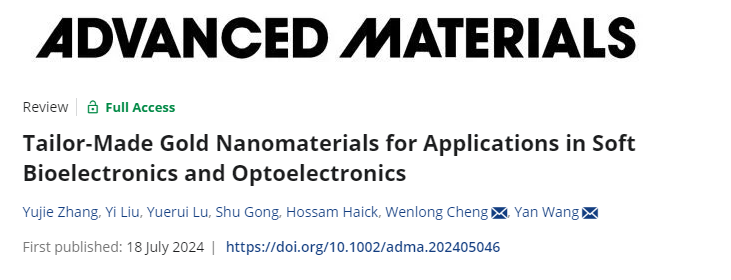
On July 18, a GTIIT master's student Zhang Yujie from Wang Yan's team published a review article titled "Tailor-Made Gold Nanomaterials for Applications in Soft Bioelectronics and Optoelectronics" in the academic journal Advanced Materials (Impact Factor 27.4) as the first author. The corresponding authors are Cheng Wenlong Cheng from the University of Sydney and Wang Yan from GTIIT.
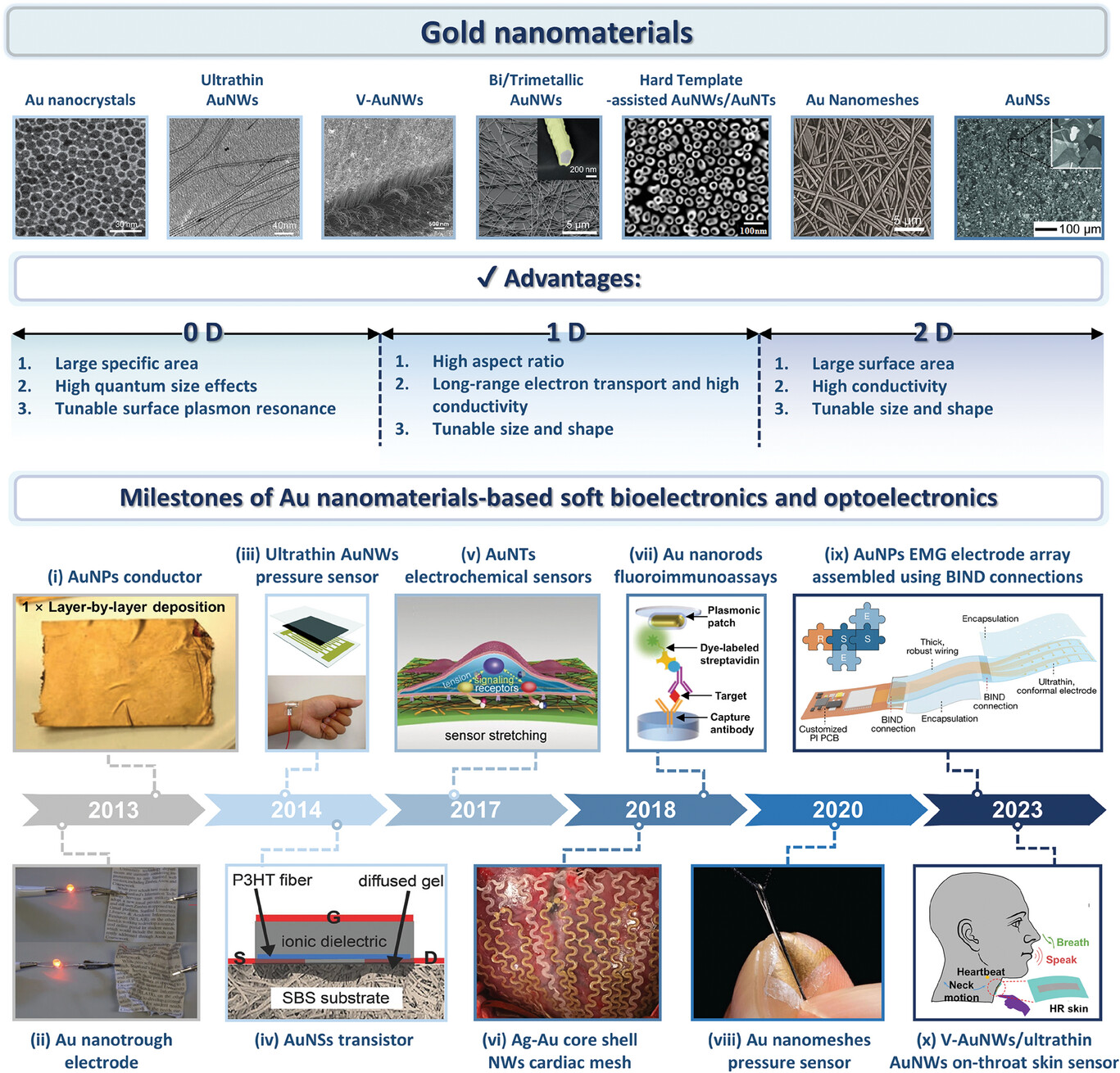
In this paper, the research team begins by discussing the design and device assembly of gold nanomaterials, systematically summarizing the synthesis methods and properties of various gold nanomaterials. The focus then shifts to applications in the fields of soft bioelectronics and optoelectronics, providing an in-depth discussion of the potential of gold nanomaterials in personalized medicine, as well as the challenges faced in material innovation, device property optimization, and system integration. The article provides a comprehensive overview of various tailor-made gold nanomaterials, including gold nanocrystals, ultrathin gold nanowires, vertically aligned gold nanowires, hard template-assisted gold nanowires/gold nanotubes, bimetallic/trimetallic gold nanowires, gold nanomeshes, and gold nanosheets. Following this, the paper describes various fabrication methodologies for state-of-the-art applications, such as strain sensors, pressure sensors, electrochemical sensors, electrophysiological devices, energy storage devices, energy harvesting devices, and optoelectronic devices. Finally, the paper discusses the remaining challenges and opportunities in this field. The researchers believe that continuous innovation and exploration will allow gold nanomaterials to play an increasingly important role in future flexible electronic technologies.
Link of the Article:https://onlinelibrary.wiley.com/doi/10.1002/adma.202405046
Wang Yan's Research Team Published High-Impact Review Articles in Advanced Materials
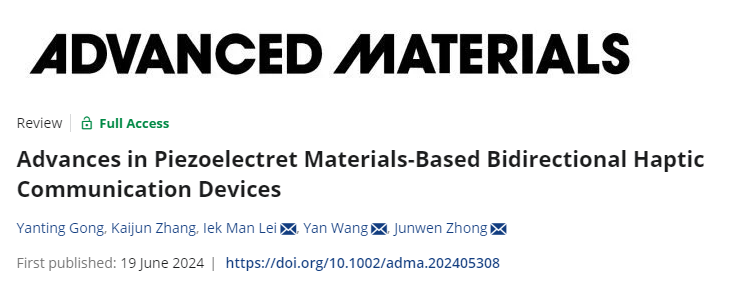
On July 19, Wang Yan's research team published a review article titled "Advances in Piezoelectret Materials-Based Bidirectional Haptic Communication Devices" in the academic journal Advanced Materials (Impact Factor 27.4). The first author of the paper is Dr. Gong Yanting, a postdoctoral researcher at the University of Macau, and the corresponding authors are Zhong Junwen, Iek Man LEI from the University of Macau, and Wang Yan from GTIIT.
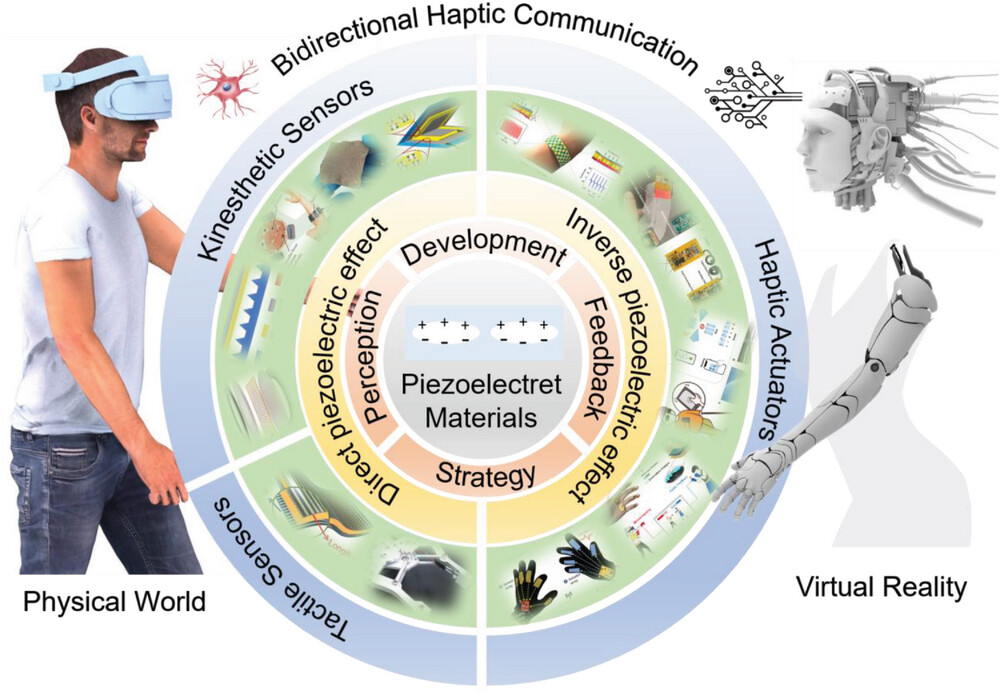
This article provides a comprehensive overview of the applications and recent developments of piezoelectret materials in bidirectional haptic communication devices. Bidirectional haptic communication devices are accelerating the revolution of virtual/augmented reality and flexible/wearable electronics. As an emerging kind of flexible piezoelectric material, piezoelectret materials can effortlessly convert mechanical force into electrical signals and respond to electrical fields by deforming, showing great potential in constructing bidirectional haptic communication devices. Existing reviews on piezoelectret materials primarily focus on their applications in flexible energy harvesters and sensors, with a lack of comprehensive reviews on the recent development of piezoelectret-based bidirectional haptic communication devices. To address this gap, this paper provides an in-depth overview of the construction of these materials and discusses the latest advances in bidirectional haptic communication devices. The article first introduces the development timeline, key characteristics, and various fabrication methods of piezoelectret materials. Subsequently, it explores the underlying mechanisms of bidirectional electromechanical signal conversion in piezoelectret materials and proposes strategies to enhance their performance by improving the d33 coefficients. Additionally, the paper elaborates on the basic principles of haptic perception and feedback, summarizing representative works and recent progress in this field. Finally, it discusses the challenges and opportunities associated with improving the overall practicability of piezoelectret materials-based bidirectional haptic communication devices. The authors believe that this review will strongly support further accelerating the development of this emerging field, promoting the widespread application and practical use of bidirectional haptic communication devices.
Link of the Article:https://onlinelibrary.wiley.com/doi/full/10.1002/adma.202405308
The research outputs are supported by projects from the National Natural Science Foundation, the Guangdong Provincial Department of Science and Technology, and the Department of Education, etc.
PROFILE | Dr. Wang Yan

Dr. Wang Yan is currently an Associate Professor at Guangdong Technion. She received her Ph.D. in Chemical Engineering from Monash University in 2018 and completed her postdoc training at the Department of Electrical and Electronic Engineering at the University of Tokyo in 2021. In soft electronics field, Dr. Wang Yan has published over 50 scientific articles in flagship journals like Science, Nature Electronics, Science Advances, PNAS, Chemical Society Reviews, etc., 27 with IF > 10, h-index of 29, 3 ESI highly cited papers, granted 1 Australia patent and applied for 2 US patents, and won several scientific awards, such as 2018 Outstanding Self-financed Students Abroad. Her research works were featured by renowned CNN, Science, major Australian media such as Herald Sun, and Japanese media such as Nikkan Kogyo Shimbun. Her group mainly focuses on materials development and the practical implementation of soft wearables in real-life situations towards ambulatory health care and the Internet of Things.
Text/Photos: Dr. Wang Yan's Team, GTIIT News & Public Affairs
© GUANGDONG TECHNION-ISRAEL INSTITUTE OF TECHNOLOGY | 粤ICP备17036470号
